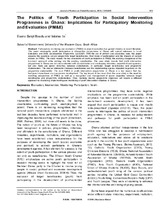| dc.contributor.author | Boadu, Evans Sakyi | |
| dc.contributor.author | Ile, Isioma | |
| dc.date.accessioned | 2021-07-22T10:35:13Z | |
| dc.date.available | 2021-07-22T10:35:13Z | |
| dc.date.issued | 2018 | |
| dc.identifier.citation | Boadu, E. S., & Ile, I. (2018). The politics of youth participation in social intervention programmes in Ghana: Implications for participatory monitoring and evaluation (PM&E). Journal of Reviews on Global Economics, 7(Special Issue), 913–925. https://doi.org/10.6000/1929-7092.2018.07.89 | en_US |
| dc.identifier.issn | 1929-7092 | |
| dc.identifier.uri | https://doi.org/10.6000/1929-7092.2018.07.89 | |
| dc.identifier.uri | http://hdl.handle.net/10566/6430 | |
| dc.description.abstract | Participatory monitoring and evaluation (PM&E) in project evaluation has gained impetus in recent literature.
This paper interrogates youth participation in intervention programmes in Ghana with special reference to Local
Enterprise and Skills Development Programme (LESDEP). With the aid of primary and secondary data, this paper
unpacks the questions around programme target beneficiaries, their mode of participation and the impacts of current
models on PM&E. The study reveals the key constraints of youth participation in PM&E, the evolving disapproval of the
top-down approach while probing into the existing opportunities. The case study reveals that youth intervention
programmes in Ghana are not only confronted with uncoordinated and overlapping ministries, department and agencies,
but also there are power dynamics between stakeholders, in particular, target beneficiaries and programme
implementers. The elusive intersection between beneficiaries and the implementing agency impacted negatively on the
programme sustainability. The poor PM&E in youth intervention programmes in Ghana is a key reason that has
hampered mainstream socio-economic development. The key lesson to be drawn from the case study is the need for
matching perspectives of PM&E as well as a recognition and management of power disparities between target
beneficiaries and programme implementers. Thus, realizing desired programme objectives will require a different
approach to structuring, implementing and monitoring of youth intervention initiatives in Ghana. | en_US |
| dc.language.iso | en | en_US |
| dc.publisher | Lifescience Global Canada Inc. | en_US |
| dc.subject | Evaluation | en_US |
| dc.subject | Intervention | en_US |
| dc.subject | Monitoring | en_US |
| dc.subject | Participation | en_US |
| dc.subject | Youth | en_US |
| dc.subject | Ghana | en_US |
| dc.title | The politics of youth participation in social intervention programmes in Ghana: Implications for participatory monitoring and evaluation (pm&e) | en_US |
| dc.type | Article | en_US |

